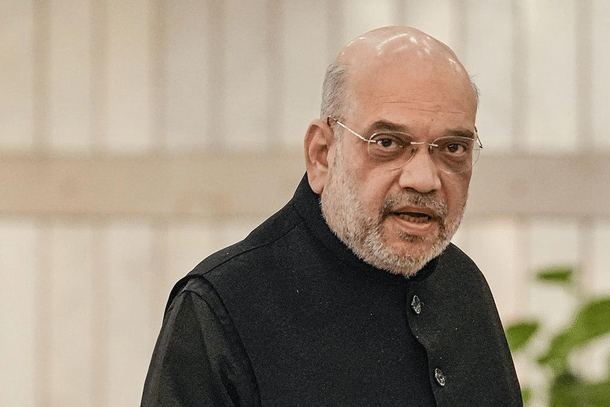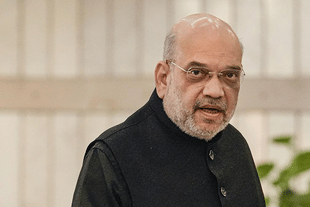Politics
This Is How MHA Under Amit Shah Neutralised Opposition To CAA
Jaideep Mazumdar
Mar 12, 2024, 06:44 PM | Updated Mar 13, 2024, 01:14 PM IST
Save & read from anywhere!
Bookmark stories for easy access on any device or the Swarajya app.


Soon after the Lok Sabha passed the Citizenship Amendment Bill (CAB) on December 9, 2019, intense protests erupted in many parts of the country, forcing the Union Government to unofficially hit the pause button.
Opposition parties, left students’ unions and Muslim organisations led the protests that rocked vast swathes of the country. The protestors’ false propaganda that the Citizenship Amendment Act (the CAB became an Act after being passed by Parliament) was an anti-Muslim law found many takers.
A little over four years later, when the Union Home Ministry notified the rules on the CAA, thus bringing the amendments to the Citizenship Act of 1955 to effect, the protests were confined largely to mostly perfunctory statements by opponents.
The muted opposition to the CAA this time is best exemplified by the statement made by Bengal Chief Minister Mamata Banerjje--perhaps the most vocal critic of the CAA--Monday (March 11) evening.
“If there is any discrimination, we won't accept it. Be it religion, caste, or linguistic. They won't be able to give citizenship to anyone in two days. This is just lollipop and show-off,” said Banerjee, before adding that she would need to study the rules that have been framed.
In December 2019, Banerjee had led rallies and protest marches against the CAA, mobilised public opinion against the Act and the BJP and even organised Shaheen Bagh-style protests in the heart of Kolkata.
Even in Assam, which was rocked by violent protests led by students’ organisations and political parties in December 2019, the protests this time have been low-key.
The ferocity of the anti-CAA protests that singed Assam last time even forced the cancellation of a Indo-Japanese summit meeting between Prime Minister Narendra Modi and his then Japanese counterpart Shinzo Abe.
Why were the protests relatively subdued and lacking in intensity this time?
The answer lies in a series of measures that were taken over the past two years by the Union Ministry of Home Affairs (MHA) in coordination with the Prime Minister’s Office (PMO).
Home Minister Amit Shah kept close tabs on the counter-measures and pre-emptive measures to contain any adverse fallout of the announcement regarding implementation of the CAA this time.
Some of these major pre-emptive measures were:
1. Outreach to Muslim organisations and community leaders:
A huge number of influential Muslim community leaders, intellectuals and moderate Muslim organisations were contacted and convinced that the CAA had nothing to do with Muslims of the country and only granted citizenship to persecuted minorities from three neighbouring countries.
These community leaders and organisations were encouraged and incentivised to reach out to the larger community and allay earlier misgivings and misconceptions about the CAA.
These low-key and localised campaigns that took place all over the country over the past two years since things normalised after the pandemic have been effective. This is why Muslim masses did not hit the streets in protest against the CAA this time.
Moreover, the Muslim community, in general, did not succumb to motivated campaigns and provocations by radical organisations and opposition parties claiming that the CAA was anti-Muslim.
2. Warning to Opposition parties and Opposition-ruled states:
The MHA made it very clear to Opposition-ruled states that strong action would be taken if law and order is not maintained and anti-CAA protests are allowed to gain momentum.
Ruling parties in these Opposition-ruled states had led or provoked the protests and even funded them last time. These protests often turned violent and riotous.
All the states were warned this time that they will be held responsible for transgressions this time and punitive action would be taken if protests crossed a red line drawn firmly by the MHA.
The likes of Mamata Banerjee, Arvind Kejriwal and M.K. Stalin were told in no uncertain terms that backing or funding anti-CAA protests, as were suspected of doing the last time, would not be tolerated.
The severity of the warning sent out by the MHA, it is learnt, was similar to Assam CM Himanta Biswa Sarma’s caution to opposition parties. Their registrations, he warned, would be promptly cancelled if they call for bandhs and strikes in violation of court orders.
Sarma also warned organisations that if protests turn violent and result in damage to public or private properties, the costs of those damages would be recovered from the culprits and also the organisations that sponsor the protests.
These warnings worked and apart from statements to the media and scattered, perfunctory protests in some areas, the news of CAA’s implementation did not meet with any fierce protests.
3. Destruction of the insidious ecosystem:
Over the last two years, the MHA has had some success in dismantling the ecosystem that organised and funded the previous round of protests.
Rules governing funding of NGOs were strictly implemented and strict vigil has been kept on the flow of funds to NGOs and civil society organisations as well as individuals who have the potential to create mischief.
The crackdown on money-laundering and black money in general by the MHA has resulted in many organisations being starved of funds and, thus, being rendered toothless.
A senior MHA officer told Swarajya that the modus operandi here was exactly what was done in Kashmir. “The flow of funds used to sponsor street protests like stone-pelting and violence in Kashmir was cut off, and the protests died down automatically. This is what has been done here as well,” he explained.
4. Judicious timing:
The timing--of issuance of the gazette notification announcing implementation of the CAA--was perfect.
With Lok Sabha elections round the corner, all opposition parties are naturally preoccupied with the polls and have little time or inclination to organise large-scale protests on an issue that will yield little political returns for them.
The common thread running in statements issued by Opposition leaders--that the BJP timed the announcement about the CAA’s implementation to gain political advantage in the elections--is an acknowledgement of the fact that an anti-CAA stance will not only yield limited electoral benefits, but can even boomerang.
The Opposition parties are well aware that the CAA enjoys widespread support among a large section of the country’s populace and opposing it vehemently or organising protests against it would not be helpful.
Hence, they only limited themselves to criticising the BJP for making the announcement just before the Lok Sabha elections.
Chief ministers of some opposition-ruled states--Mamata Banerjee, M.K.Stalin, Pinarayi Vijayan and Arvind Kejriwal--vowed not to implement the CAA in their states.
But they know well that states are powerless in this regard and the MHA has framed the procedures for granting citizenship in a manner that bypasses states.
The MHA has apparently done its homework well this time. And just as Prime Minister Modi’s prediction that freeing Kashmir of Article 370 would not cause any bloodshed turned out to be true, Amit Shah’s assurance that the implementation of the CAA would be welcomed is also coming true.





